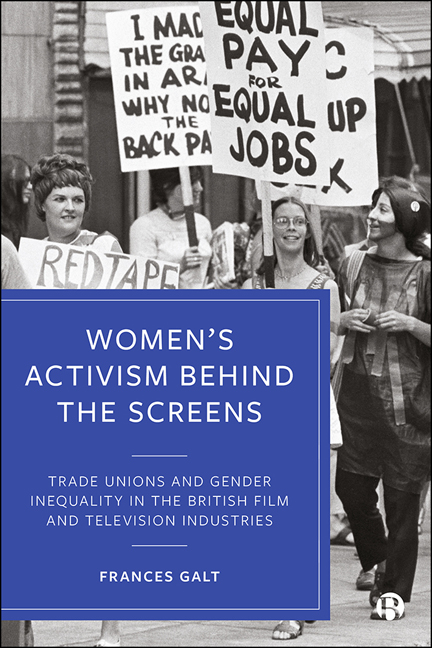 Women's Activism Behind the Screens
Women's Activism Behind the Screens 2 - Catalysts for Change, 1960–75
Published online by Cambridge University Press: 17 April 2021
Summary
In 1973, ACTT women activists established the Sub-Committee on Discrimination Against Women – renamed the Committee on Equality in February 1974 and referred to as such throughout – and presented three motions to the ACTT's 1973 Annual Conference which called on the union to challenge gender discrimination in the British film and television industries. This included the demand for an investigation into gender discrimination which culminated in the publication of the Patterns of Discrimination Against Women in the Film and Television Industries (hereafter Patterns) report in 1975. In his editorial following the conference, Research Officer and Journal Editor Roy Lockett (May 1973: 5) reflected on the magnitude of the motions: ‘It is one of the oddities of ACTT's history that before the beginning of 1973, the demands made at the Conference hadn't been heard at any level of the ACTT's structure’. In her longitudinal study of women in the British labour movement, Sarah Boston (2015: 290) later identified the 1973 conference as the moment when the ACTT was ‘shaken from its complacency’. The conference marked a significant watershed in the relationship between women and the ACTT.
This chapter traces the catalysts for the establishment of the COE and the demand for an investigation into gender discrimination at the 1973 conference. Firstly, it examines demographic changes in the workforce and union during the 1960s to contextualize women's growing frustration with gender discrimination. Secondly, it reflects on the emergence of the women's liberation movement and upsurge of industrial unrest in Britain between 1968 and 1973 to demonstrate their influence on women's militancy within the ACTT. The chapter then explores women's lived experiences of trade union activism in the ACTT following the establishment of the COE in 1973 to the publication of the Patterns report in 1975, with particular focus on the process of the investigation into discrimination.
1960–68: the ‘roots’ of later militancy?
In her longitudinal study, Sarah Boston (2015: 264) argues that the ‘roots’ of women's militancy in the British labour movement were evident between 1960 and 1968. In a chapter indicatively titled ‘Little Indication of Progress’, Boston (2015: 264) identifies 1960 to 1968 as a transitional period for women in the British labour movement, situated ‘between the conservation of the 1950s and the new militancy of which the strike of machinists at Fords, Dagenham, in 1968 marked the beginning’.
- Type
- Chapter
- Information
- Women's Activism Behind the ScreensTrade Unions and Gender Inequality in the British Film and Television Industries, pp. 63 - 102Publisher: Bristol University PressPrint publication year: 2020


